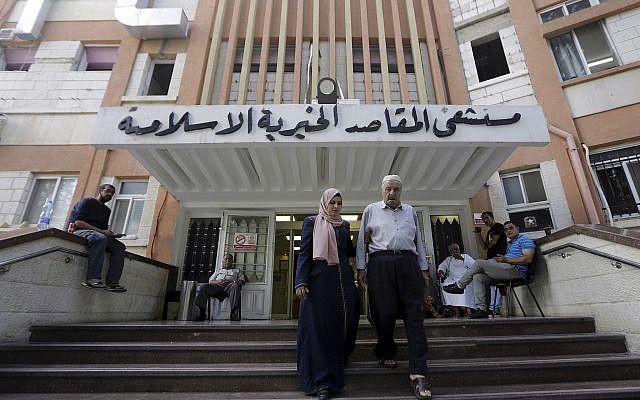Even though a fragile ceasefire has put an end to the fighting between Israel and Hamas terrorists, many Gazans with permits to enter Israel for medical treatment were still unable to do so on Wednesday.
Israel issues permits for Gazans who receive referrals to hospitals in Israel and the West Bank for treatments not available in the blockaded coastal enclave.
The Israeli military closed the crossings during the 11-day war last month between Israel and Gaza-based Palestinian terrorists. After the ceasefire, the Defense Ministry announced that Gazans seeking medical treatment in Israel would once again be allowed to enter.
But Israeli officials later clarified that only Gazans in need of “life-saving” treatment will be allowed to cross at the present time.
“In light of current situation assessments, the only patients who can enter Israel from Gaza are those who need life-saving medical care and those whose lives are in immediate danger,” said the military’s liaison to the Palestinians, known widely by its acronym COGAT.
Salwa, a Gaza resident with cancer, holds a three-month entry permit that allows her to enter and exit Israel to attend chemotherapy sessions at Jerusalem’s Augusta Victoria hospital.
Since the war, Salwa — whose name has been changed to protect her privacy — has repeatedly sought to enter Israel, only to be turned back. Her last chemotherapy session was scheduled for May 23, but she missed it due to the new restrictions.
“Every day we call them or go to the checkpoint, only for them to say that we can’t go through today, either. It’s terrible to watch her slowly fall apart, and know we can’t help,” Salwa’s husband, who spoke on condition of anonymity, said in a phone call from the northern Gaza Strip.
Salwa’s husband rejected the notion that his wife’s chemotherapy was not “urgent.”
“These are complex treatments, and they need to be taken on time. If she doesn’t get her treatment, her condition could deteriorate further,” he said.
Israel and Egypt have blockaded the coastal enclave since 2006, imposing tight restrictions on the movement of people and goods. Both countries argue that the blockade prevents Hamas terrorists from posing an even more serious security threat.
Rights groups lament the impact the restrictions have had on Gaza’s civilian population. Many Gazan hospitals are poorly equipped and many medical procedures — such as chemotherapy for cancer patients — are simply not available in the Strip.
During the recent round of fighting between Israel and the Hamas terror group, Israel shut down all the crossings with the Gaza Strip. Only a few exceptions were made for specific aid convoys to enter the coastal enclave during the fighting. According to the Israeli military, Palestinian terrorists bombarded the convoys, wounding a soldier.

Palestinians leave the Makassed hospital in East Jerusalem, September 9, 2018. (Mahmoud Illean/AP)
At the same time, Israeli authorities have accepted far fewer referrals from Gazans seeking urgent care since the escalation.
According to the rights group Physicians for Human Rights-Israel, only 7 percent of urgent requests were accepted by Israeli authorities between May 25 and May 31. Before the current escalation, the acceptance rate was around 66 percent.
On Monday, 62-year-old Gaza resident Ahmad Abd al-Harati died after his referral for urgent care at the al-Makassed Hospital in East Jerusalem was denied. Abd al-Harati suffered from a tumor in his tongue and throat, according to PHR-I.
A number of human rights groups, including PHR-I, have petitioned the Supreme Court to examine the new policy. A date for a hearing has yet to be set.
"enter" - Google News
June 02, 2021 at 05:01PM
https://ift.tt/3fGAJsI
Despite ceasefire, most Gazans seeking medical care still can't enter Israel - The Times of Israel
"enter" - Google News
https://ift.tt/2TwxTMf
https://ift.tt/3d6LMHD
Bagikan Berita Ini














0 Response to "Despite ceasefire, most Gazans seeking medical care still can't enter Israel - The Times of Israel"
Post a Comment